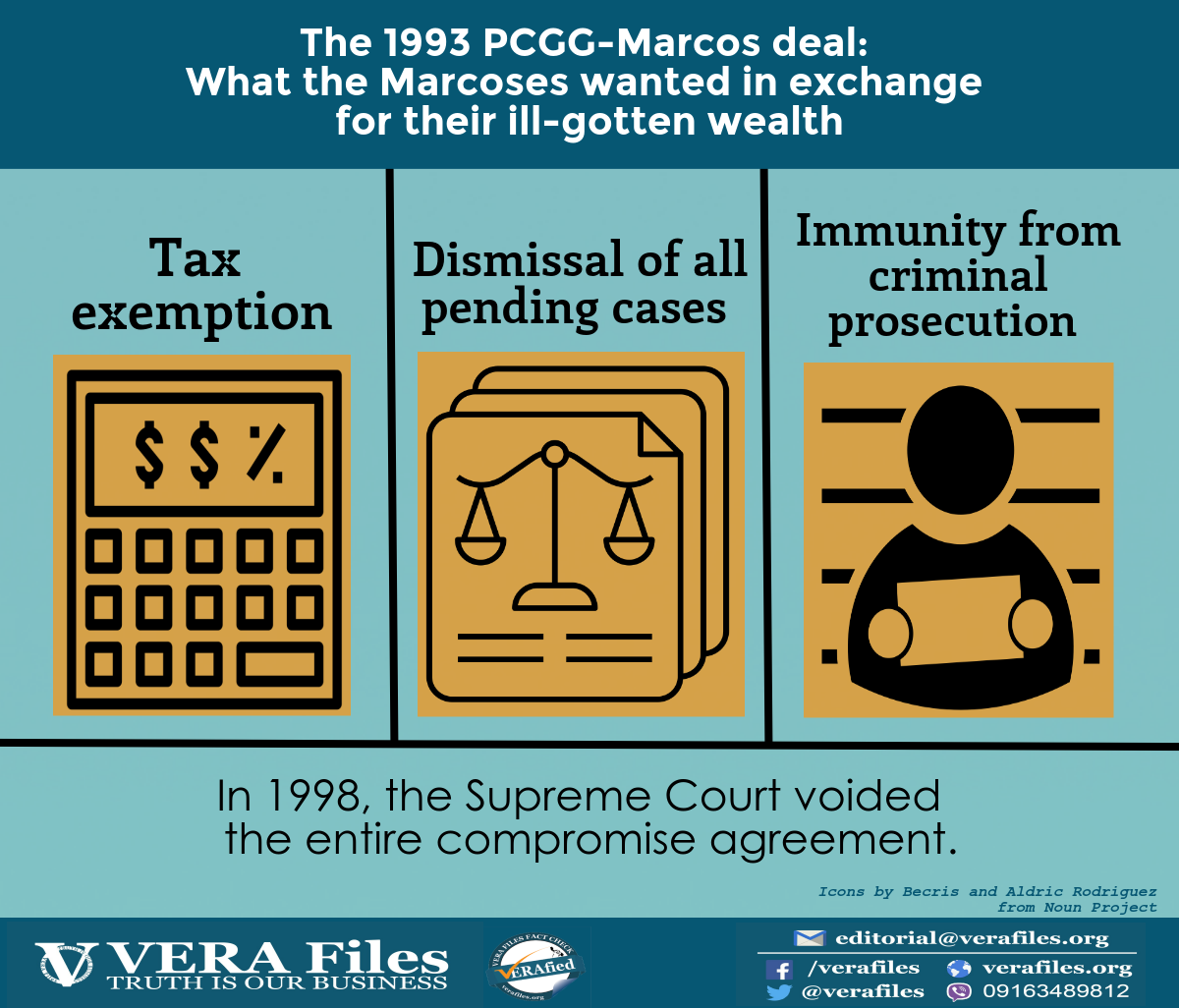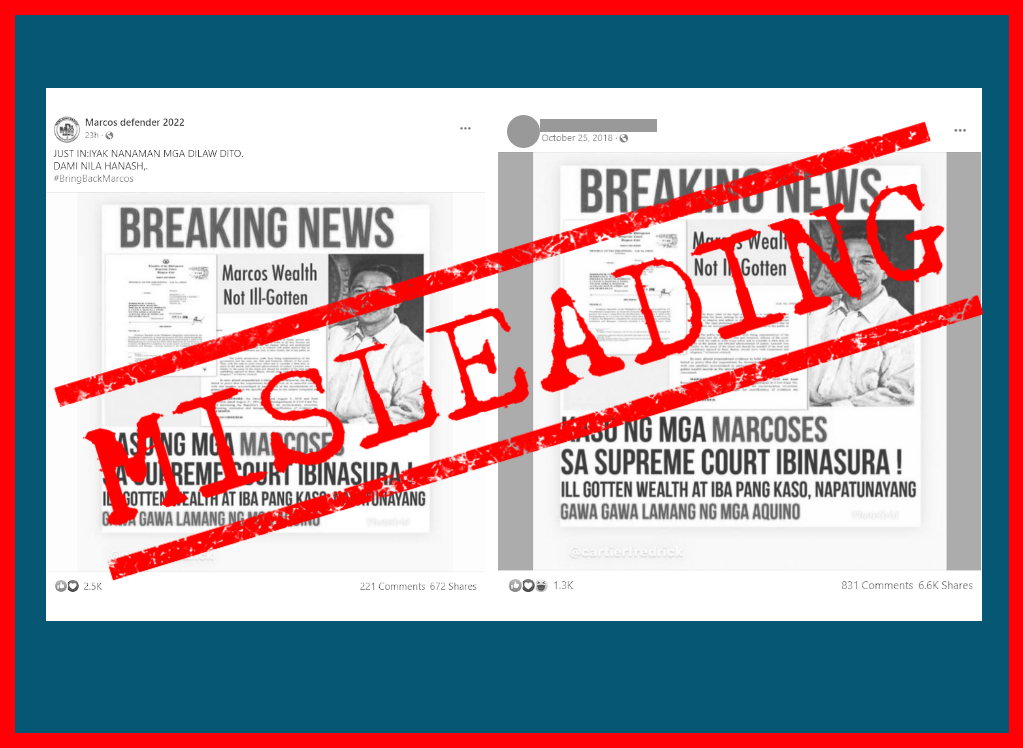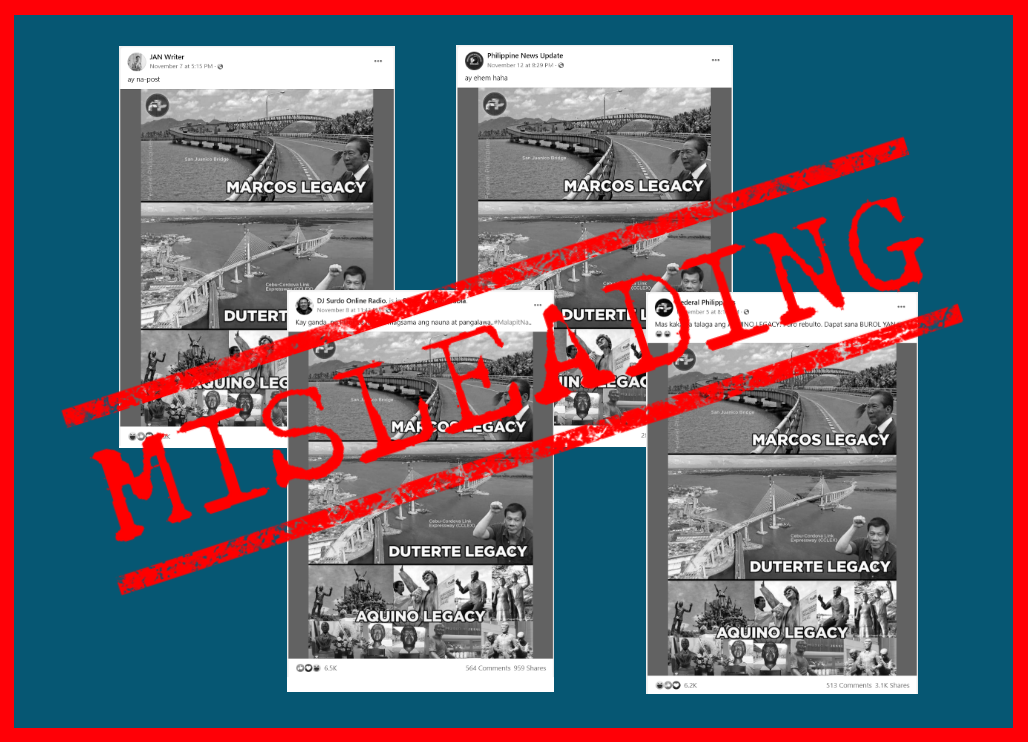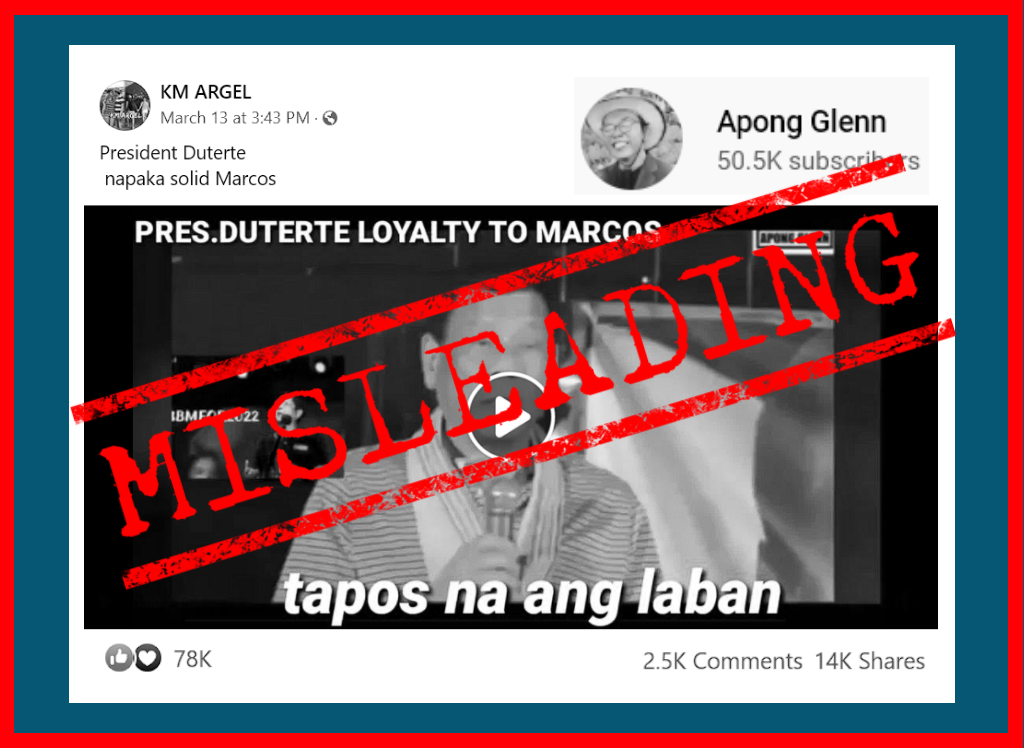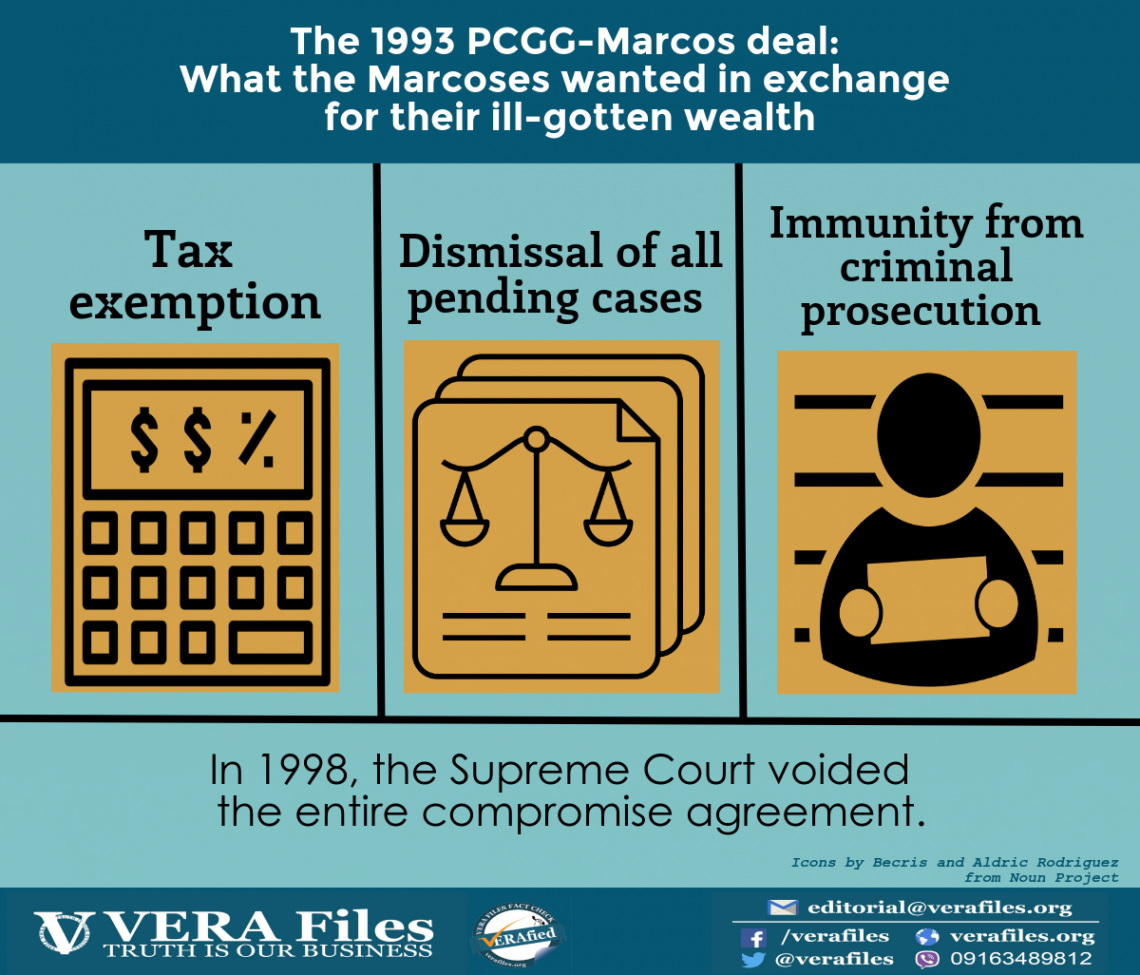
President Rodrigo Duterte wants to end during his term the long-drawn quest to recover the wealth stolen by the Marcos family.
He said he will facilitate an agreement with the Marcoses and pass it on to Congress. In exchange, the family of the late dictator would want to have immunity from further prosecution, he said.
In a speech Sept. 5, Duterte said:
“Itong mga Marcos, hindi ito papayag na isauli nila tapos kulungin mo sila. So I said you have to craft a law on that, and that is immunity. Hindi mga bobo ‘yan… ‘O sige isauli ko, pero huwag mo akong kulungin… ganoon ‘yan.’ Otherwise, kung kulungin mo ako, kung ako si Marcos, bakit ko isauli (The Marcoses won’t agree to return the wealth if you’d still lock them up. So I said you have to craft a law on that, and that is immunity. They’re not stupid. ‘Okay, I’ll return it but don’t lock me up.’ Otherwise, if I were Marcos and you’d still put me behind bars, if I were Marcos, why would I return anything?) Then I’d rather reserve it for my children and grandchildren.”
Source: Media Interview of President Rodrigo Roa Duterte, Sept. 5, 2017 watch from 2:50-3:18
The president provided no more detail, except the immunity would be enacted in consultation with the Department of Justice, the Department of Finance and the Bangko Sentral ng Pilipinas.
If history were any indication however, getting a deal is not going to be easy.
Twenty-four years ago, the Marcoses and the Presidential Commission on Good Government, the agency created to recover the family’s ill-gotten wealth, signed a compromise agreement which sought to end all pending litigation on the family’s assets.
The agreement was signed in secret on December 28, 1993, three months after the Sandiganbayan found former first lady and now Ilocos Norte 2nd District Rep. Imelda Marcos guilty of graft.
The signatories were the PCGG, through then Chairman Magtanggol C. Gunigundo, and Imelda with and her children Ilocos Norte Governor Imee Marcos and Irene Marcos-Araneta.
The agreement was supposed to be presented for approval to then President Fidel V. Ramos, who in his July 1993 State of the Nation Address encouraged compromises on the Marcos ill-gotten wealth, subject to guidelines established by Congress.
In 1995, the deal became public after a petition for its approval was filed in the Sandiganbayan. It was later dubbed the “secret Marcos-PCGG compromise of 1993,” and caused an uproar.
Ramos responded by issuing a statement, saying he “did not authorize Gunigundo to approve any agreement with the Marcoses and would have disapproved them, had they been submitted to me.”
He added that the full powers of attorney he issued to Gunigundo in 1994 did not authorize the latter to “approve said Agreements, which I reserve for myself as President of the Republic of the Philippines.”
Albeit still missing Ramos’ signature, the deal was questioned before the Supreme Court by the late solicitor general Frank Chavez.
In 1998, the Supreme Court voided the so-called secret deal, including the following terms among others.
Tax exemption
In the agreement, the assets retained by the Marcoses would be “net and exempt from all kinds of taxes.”
The family committed to make an inventory of all their assets and their locations, with the assets classified as follows:
– real estate
– jewelry
– paintings and other works of art
– securities
– funds on deposit
– precious metals and
– other assets that don’t fall under any of the abovementioned categories
Based on this inventory, the PCGG would determine which assets would be surrendered to the government, and which would be retained by the Marcoses.
The Supreme Court declared this provision unconstitutional, saying only Congress has the power to tax and grant tax exemptions.
Even if Congress passes a law, “any special grant of tax exemption in favor only of the Marcos heirs, will constitute class legislation,” it added.
Class legislation pertains to any law that grants a special privilege to one class of people and a burden to another or both. This would violate the constitutional rule that taxation “shall be equitable and uniform.”
More, the high court said that while Bureau of Internal Revenue commissioners can grant tax exemptions, it can only do so in specific instances — none of which were applicable to the case of the Marcoses.
Dismissal of all pending cases
Also under the deal, the government would dismiss “all other cases pending before the Sandiganbayan and all the other courts” and stop filing new cases against the Marcoses once the family has submitted its list of assets.
According to the Supreme Court, this provision interfered with judicial powers.
“Once a case is filed before a court of competent jurisdiction, the matter of its dismissal or pursuance lies within the full discretion and control of the judge,” it ruled.
The PCGG, which prosecutes ill-gotten wealth cases, “cannot guarantee the dismissal of all such cases against the Marcoses pending in the courts.”
Immunity from criminal prosecution
Finally, the deal included criminal immunity for the Marcoses, which the Supreme Court also struck down.
Compromise agreements are permitted and generally encouraged in civil cases, but not in criminal cases faced by the Marcoses, the high court ruled.
“Criminal immunity cannot be granted to the Marcoses who are principal defendants in the spate of ill-gotten wealth cases now pending before the Sandiganbayan,” it said. “The provision is applicable mainly to witnesses who provide information or testify against a respondent, defendant or accused in an ill-gotten wealth case.”
Consequently, some 289 cases against the Marcoses and their cronies remain pending in various courts. The PCGG estimates the value of the family’s ill-gotten wealth to be between USD 5 to 10 billion.
Since 1986, PCGG has recovered almost USD 4 billion.
Sources:
AbsCbn.com. Thousands gather at UPLB expecting part of Marcos wealth. Sept 23, 2017
Interaksyon.com. LOOK | Thousands of Marcos loyalists flock to UP Los Baños. Sept 23, 2017
Inquirer.net. Thousands flock to UPLB to get P1M each ‘from Marcos wealth.’ Sept 24, 2017
RTVMalacañang. Media Interview of President Rodrigo Roa Duterte. Sept. 5, 2017
G.R. No. 126995. Imelda Marcos vs. The Honorable Sandiganbayan (First Division) January 29, 1998
G.R. No. 130716. Chavez vs. PCGG. December 9, 1998
Section 28, Article VI of the 1987 Constitution
Executive Order No. 14, s. 1986
Executive Order No. 14-A, s.1986
Black’s Law Dictionary 2nd Edition
Salonga, J. (2000). Presidential plunder: The quest for the Marcos ill-gotten wealth. Quezon City. University of the Philippines
(Guided by the code of principles of the International Fact-Checking Network at Poynter, VERA Files tracks the false claims, flip-flops, misleading statements of public officials and figures, and debunks them with factual evidence. Find out more about this initiative.)
